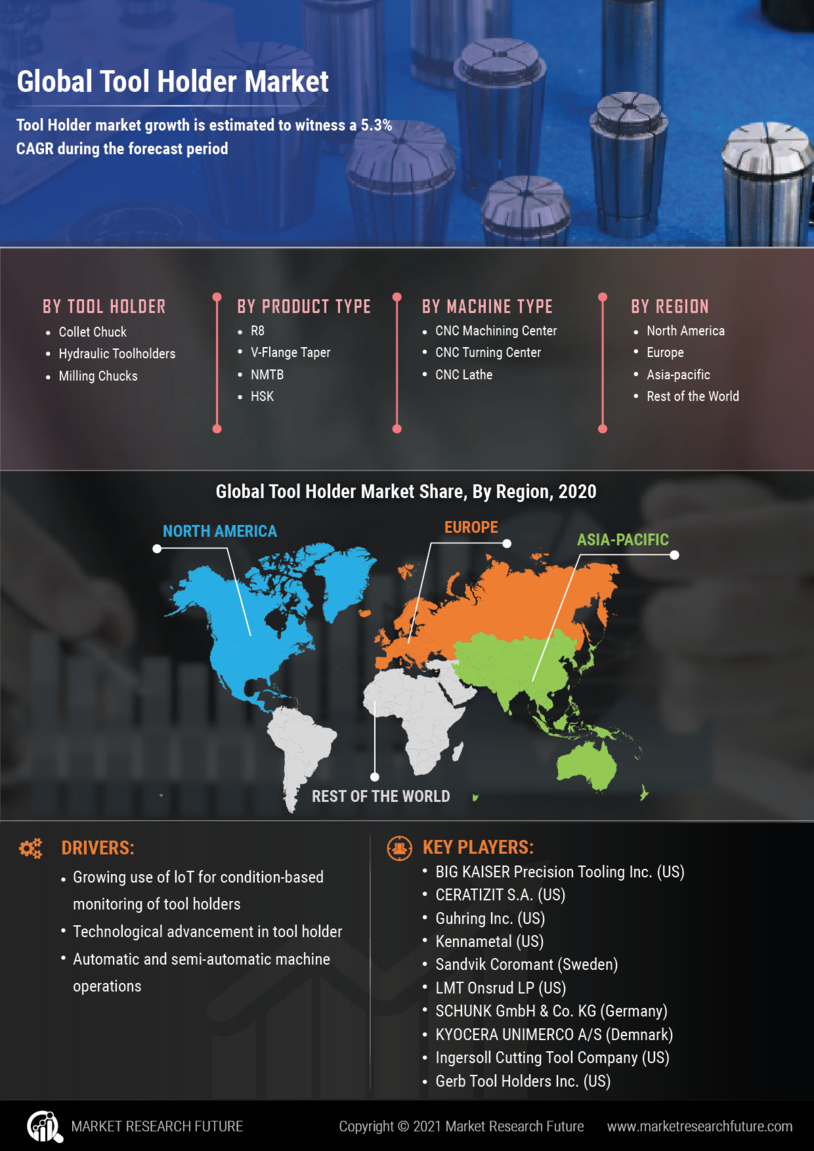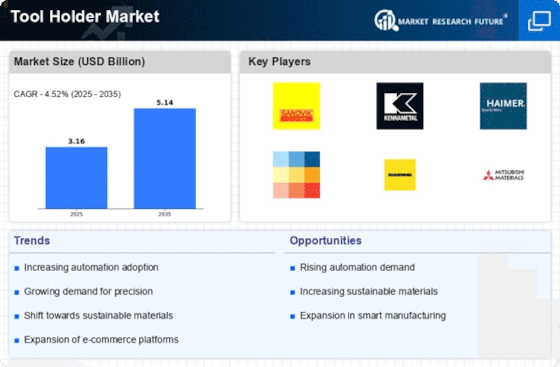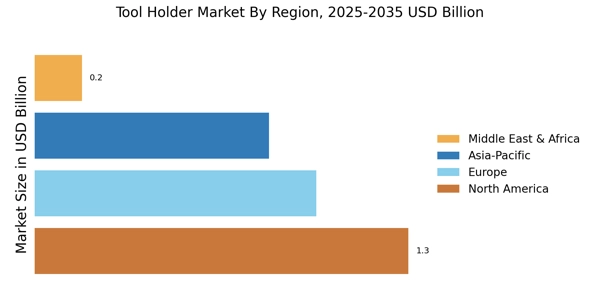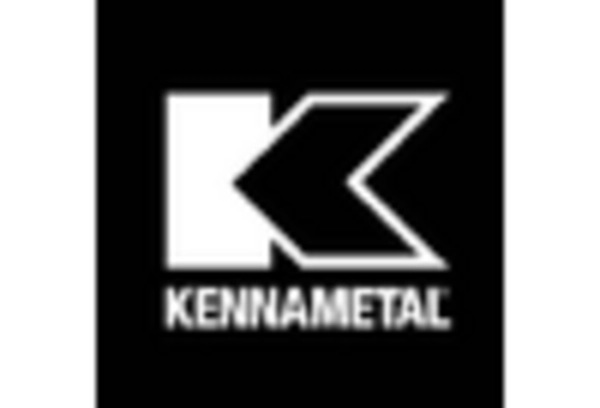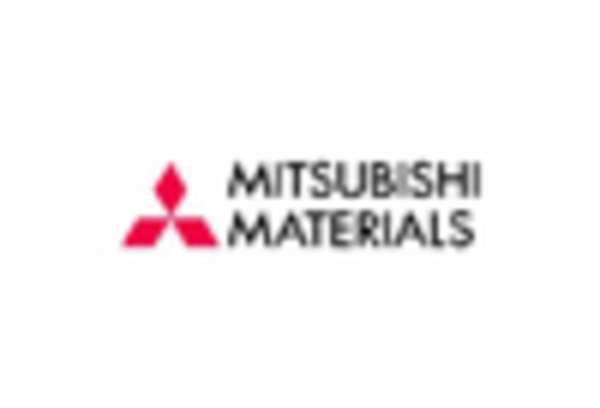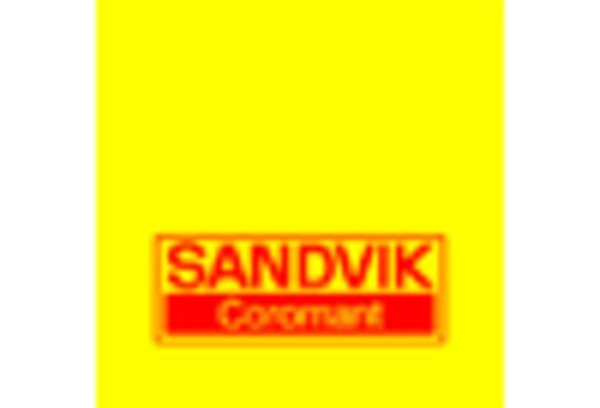Rising Demand for Automation
The Tool Holder Market is experiencing a notable increase in demand for automation across various manufacturing sectors. As industries strive for enhanced efficiency and productivity, the integration of automated systems necessitates the use of advanced tool holders that can accommodate automated machinery. This trend is particularly evident in sectors such as automotive and aerospace, where precision and reliability are paramount. According to recent data, the automation market is projected to grow significantly, which in turn is likely to drive the demand for sophisticated tool holders. Manufacturers are increasingly investing in innovative tool holder designs that can seamlessly integrate with automated processes, thereby enhancing operational efficiency and reducing downtime. This shift towards automation not only influences the design and functionality of tool holders but also shapes the competitive landscape of the Tool Holder Market.
Emergence of Advanced Materials
The Tool Holder Market is witnessing a shift towards the use of advanced materials in tool holder manufacturing. Innovations in material science have led to the development of tool holders that are not only lighter but also more durable and resistant to wear and tear. Materials such as carbon fiber and high-performance alloys are becoming increasingly popular, as they offer enhanced performance characteristics. This trend is particularly relevant in high-speed machining applications, where tool holders must withstand extreme conditions. The adoption of advanced materials is likely to improve the overall efficiency and lifespan of tool holders, thereby appealing to manufacturers seeking to optimize their machining processes. As the industry continues to evolve, the integration of these materials into tool holder designs may redefine standards within the Tool Holder Market.
Growth of the Manufacturing Sector
The Tool Holder Market is poised for growth, largely driven by the expansion of the manufacturing sector. As countries continue to industrialize, the demand for high-quality tool holders is expected to rise. Recent statistics indicate that the manufacturing sector has shown resilience and growth, particularly in regions focusing on infrastructure development and technological advancements. This growth is likely to create a robust demand for tool holders that can support various machining processes. Manufacturers are increasingly seeking tool holders that offer precision, durability, and versatility to meet the evolving needs of the industry. The expansion of manufacturing capabilities, coupled with the need for efficient production processes, suggests a promising outlook for the Tool Holder Market, as companies invest in tools that enhance productivity and reduce operational costs.
Increased Focus on Precision Engineering
The Tool Holder Market is significantly influenced by the growing emphasis on precision engineering across various sectors. As industries such as aerospace, medical devices, and electronics demand higher accuracy in machining processes, the need for precision tool holders becomes paramount. Manufacturers are increasingly investing in tool holders that can deliver superior accuracy and repeatability, which are essential for high-quality production. Recent trends indicate that precision engineering is not merely a preference but a necessity for competitive advantage. This focus on precision is likely to drive innovation within the Tool Holder Market, as companies strive to develop tool holders that meet stringent quality standards. The integration of advanced technologies, such as computer numerical control (CNC) machining, further underscores the importance of precision in tool holder design and functionality.
Sustainability Initiatives in Manufacturing
The Tool Holder Market is being shaped by the increasing emphasis on sustainability within manufacturing processes. As companies seek to reduce their environmental footprint, there is a growing demand for tool holders that are designed with sustainability in mind. This includes the use of recyclable materials and energy-efficient manufacturing processes. Recent data suggests that manufacturers are prioritizing sustainable practices, which is likely to influence their choice of tool holders. The shift towards sustainability not only aligns with regulatory requirements but also appeals to environmentally conscious consumers. As the Tool Holder Market adapts to these changes, manufacturers that embrace sustainable practices may gain a competitive edge, positioning themselves favorably in a market that increasingly values eco-friendly solutions.
